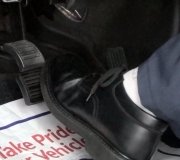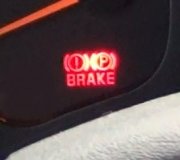Since the fluid is still full, that rules out an external leak. The most likely suspect is internal leakage inside the master cylinder. When you press the brake pedal, fluid bypasses the internal rubber lip seals rather than getting pushed down to the wheels. What is unusual, however, is all brake systems since the late '60s have two independent systems tied together, so if one part fails, you still have brakes on the other two wheels. It is very uncommon for both systems to fail at the same time.
Related to this, in any master cylinder that is more than about a year old, crud and corrosion build up in the lower halves of the bores where those seals live. Normally you can only push the brake pedal no more than halfway to the floor, so those seals never travel through the lower parts of the master cylinder and over that corrosion. What often happens to competent do-it-yourselfers is they try to pedal-bleed the air out of the system after performing other repairs, and in so doing, their helper pushes the brake pedal all the way to the floor. That is when the lip seals finally run over that built-up corrosion, and that can rip them. When that damage occurs to just one seal, the good one still builds pressure for two of the wheels. The good pressure on one half and no pressure on the other half is what trips a switch that turns on the "Brake" warning light. The pedal will go much closer to the floor than normal, but there will still be some braking power.
What may also have happened is one of the lip seals just decided to fail, then, since the brake pedal would naturally travel further than normal, that was far enough to cause the second seal to run over the corrosion and be torn at that same time. That would leave you with no brakes to any wheel. That type of failure is fairly rare. Typically the second seal will last another day or two, or at least long enough to safely stop the vehicle.
When both lip seals are damaged, no pressure can be built up in either half of the system. Since the difference is 0 psi, the "pressure-differential" switch doesn't trip, and the warning light doesn't turn on. That 0 psi is no different than when the brake pedal is not being pushed.
Sunday, February 21st, 2021 AT 11:06 AM



